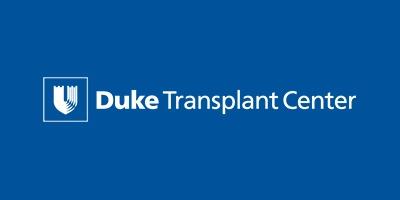
The Duke Transplant Center (DTC) of the Duke University School of Medicine aims to promote cross-disciplinary clinical, translational, and basic research with the ultimate goal of optimizing transplant organ longevity and improving quality of life of transplant recipients. This is the inaugural annual call from the DTC for proposals for pilot and feasibility studies.
Background
The Duke Transplant Center (DTC) of the Duke University School of Medicine aims to promote cross-disciplinary clinical, translational, and basic research with the ultimate goal of optimizing transplant organ longevity and improving quality of life of transplant recipients. This is the inaugural annual call from the DTC for proposals for pilot and feasibility studies.
Objectives
Through the current funding opportunity, we aim to accomplish two specific objectives: (1) to catalyze collaborations between investigators within and outside DTC; and (2) to identify and validate novel approaches for personalizing transplantation aiming at risk stratifying, monitoring, and enhancing transplant graft outcomes. Areas of interest include, but are not limited to:
- Molecular donor-recipient matching
- Non-invasive immune monitoring
- Early diagnosis of opportunistic infections
- Personalized pharmacogenetics
- Effects of microbiome on transplant outcomes
- Computational pathology
Successful pilot and feasibility studies will serve as a basis for subsequent applications for independent research support. Typical awardees will either be early-stage investigators or established investigators who propose to establish new research collaborations to advance the mission of DTC.
Eligibility and Scope of Applications
Clinical, translational, and basic research investigators who have an MD, PhD, or equivalent and a faculty position or a faculty sponsor within Duke University are all eligible to apply. Additional eligibility includes DTC direct report staff and transplant ancillary staff. Investigators need to justify how the proposed studies relate to the broad mission of DTC and the two specific objectives of this announcement. Preliminary data are encouraged but not crucial. Applications that foster collaborations between DTC and non-DTC investigators are particularly encouraged.
Application Instructions
The proposal section should be in MS Word format, 2 pages minimum and 3 pages maximum. This section should include a project description, specific aims, proposed research, expected outcomes, and connectivity to the mission of this funding opportunity; and should specifically address how the proposal advances one or both of the two specific objectives. Additional information to accompany the application (but outside the page limit) should include investigator NIH biosketch, project timeline, and budget. The top three meritorious proposals will be awarded.
Key Dates
Completed applications are due no later than January 15, 2020.
Budget
Budgets must be well justified and may not exceed $20,000 in total costs. Budgets should be for one year in duration.
Requirements of Awardees
Awardees are required to submit a final report of the study’s findings twelve months after receiving funding. Awardees will present their findings at the annual DTC Research Symposium after the conclusion of the pilot study.
Contact Information
Lauren G. Anderson, PhD, Director of Research Development
Email: lauren.g.anderson@duke.edu
Section of Surgical Disciplines, Duke University School of Medicine